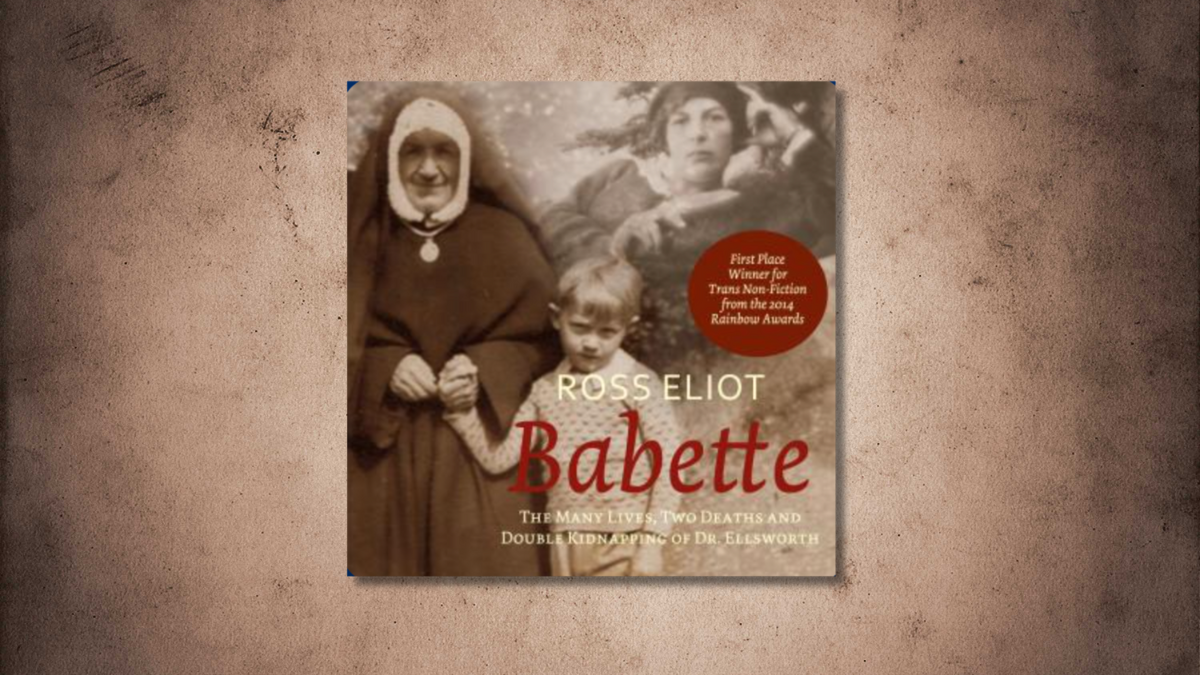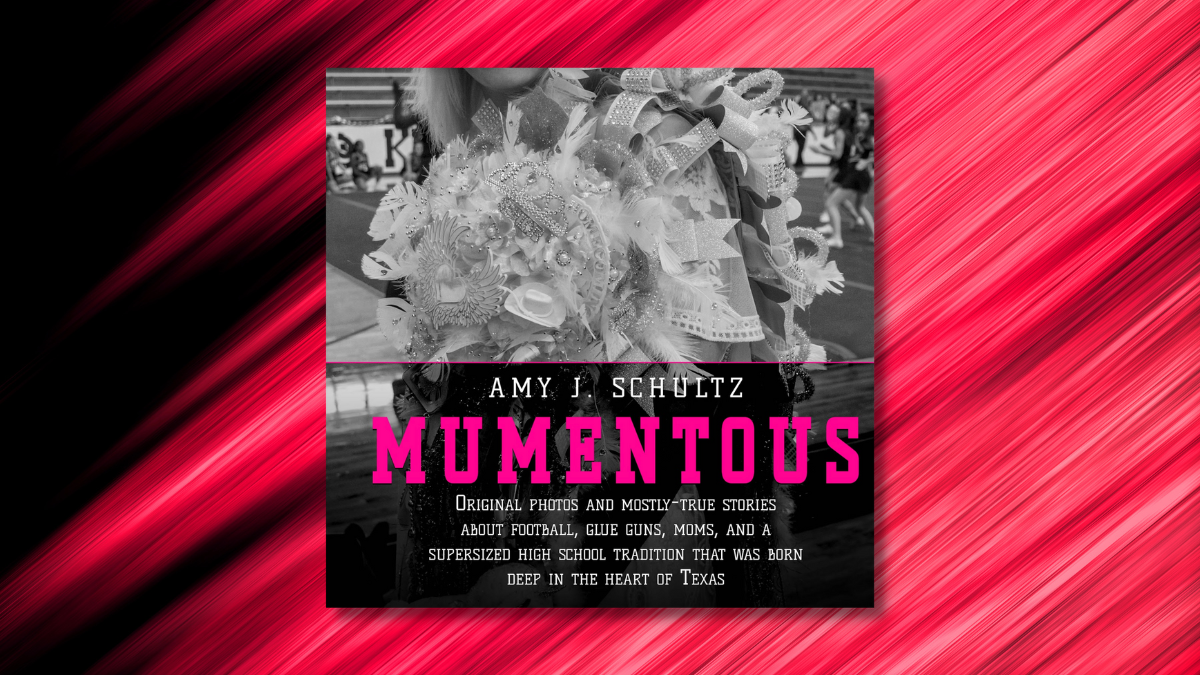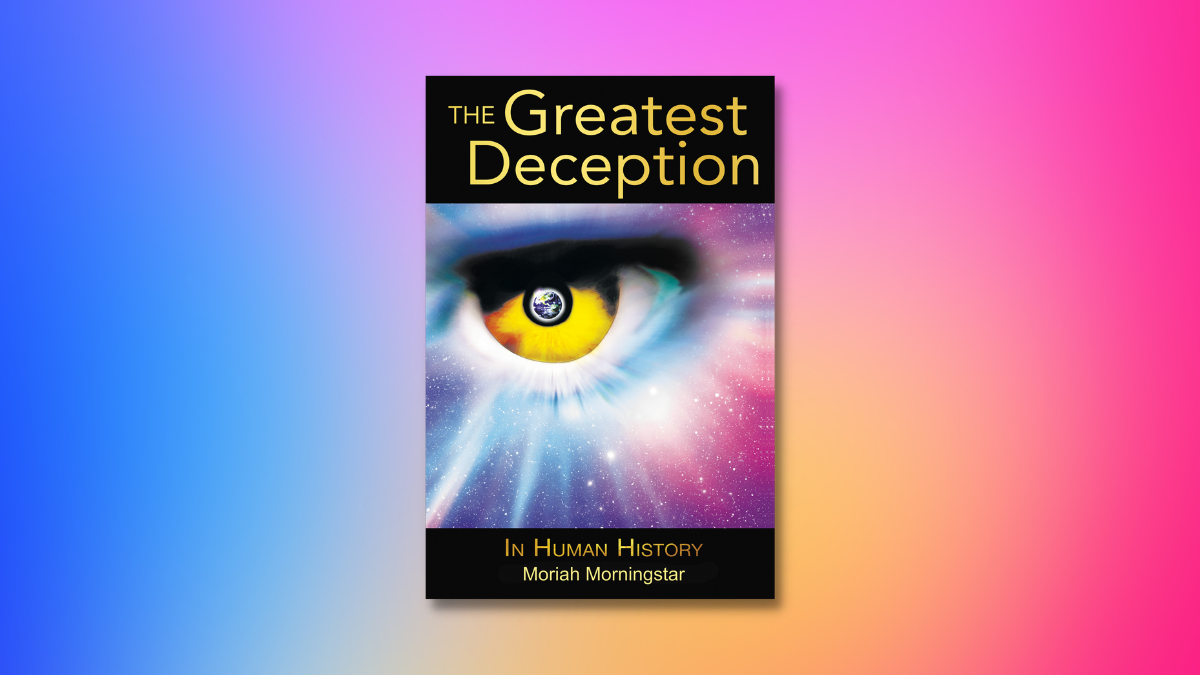
Babette
by Ross Eliot
Genre: Memoir / LGBTQ / Audiobook
Run Length: Approx. 12 hrs
Reviewed by Andrea Marks-Joseph
A riotous romp with a hilarious, history-making, wildly problematic professor who you can’t help but adore
This story is absurd, incredible, inappropriate—and completely true! It is a record of the years-long rollercoaster-ride of Ross Eliot living with his elderly history professor, Babette. But it’s more than that too. It’s a precious and poignant record of queer history, as told through the author’s memories of sharing a home and making a life with this mysterious, magnificent trans person.
When reading Babette, I felt uncomfortable, I felt inspired, and I felt like with every turn of the page I grew deeper in my understanding of the gift that Eliot has given us with this unadulterated look at her life.
Babette is a trailblazing trans woman who broke boundaries and crossed lines. She made enemies of her loved ones and found family of her students. She lied and schemed and never took the possibilities of life for granted. This book is an important part, not only of queer and trans history, but a history of humanity and the bravery and brazenness it takes to live a full, dazzling life, and to truly leave your mark.
And it’s in audio! Babette’s general narration speed at 1x feels more like my usual 1.2x, which made it a comfortable listen for me, but could require a more concentration for readers who are used to listening at a slower speed. While the dialogue between characters is spectacularly conversational and natural-sounding, Eliot’s descriptive narration comes at a slower pace with a dramatic tone. I loved that most chapters open with a compelling quote that is relevant in context, as the collective quotes in themselves end up feeling like an archive of desire and transness, and a lesson in seeing the world from a perspective inspired by Babette.
Chapters vary in length, but each is perfectly-sized for its thematic place in the Babette world. There is music at the end of each chapter, and the sounds levels between that and the narration can vary. This may take a few chapters to acclimate to, especially when the song’s heightened drama doesn’t fit the scene we’ve just read.
While I did not quite believe or grasp the accent Ross Eliot used when narrating Babette’s voice—in the way it didn’t feel quite French, German or consistent in its off-kilter pronunciation—I really enjoyed the voices and performances of various side characters. I often found myself laughing out loud at random one-liners, and being charmed by a character who we meet for just one scene, purely based on Eliot’s entertaining vocal performances. Eliot must be commended for creating moments that feel just as wonderful as if we had met someone new and fantastic in real life. (Highlights include a nightclub announcer playfully mocking Ross over the speakers, for sitting at the bar with a book and the delightful recognition of a man’s voice emphasized while speaking through a megaphone.) Eliot is clearly a very skilled performer and excels especially in bringing the emotional scenes—both tearful voices cracking, and words breaking through laughter—to life.
“Funny you should ask. I moved here a year ago from Seattle and now live in the pantry of my history professor who’s an old French-Nazi-sympathizing-trans-Benedictine-nun.”
This book feels so much more like a psychedelic adventure into a fictional world than it does a view of a history professor’s home and a young student who helped keep her life organized-ish. It doesn’t read like any nonfiction I’ve read before—because it’s a story that hasn’t been told before.
This really happened. This is real life. But how! How is nobody objecting to this bizarre, inappropriate, sudden and shocking (entirely platonic, to be clear) relationship? How was Ross, at 22 years old, a student of Babette’s, suddenly living in her home and privy to her secrets? How is she parading around naked and proclaiming her adoration for Hitler and compassion for his soldiers, and everyone was smiling and nodding and going on with their lives? It makes for such a curious read.
If you think of Babette—the book and the woman—as your most flamboyant, problematic great-aunt who breezes in and out of your family home, bestows gifts and unfathomable tales upon you, and then ventures back out into the world to accumulate more outrageous trinkets for her next visit—this all makes more sense. If you can equate this Babette with the way you love a generous, loving grandparent who occasionally tells racist jokes, you’ll get this book.
Our grandparents and great-aunts and melodramatic professors take up an unmistakable space in world history, and we must listen to their stories. We mustn’t forget the world that shaped them into who they are—and most importantly, we must recognize and honor the way they shaped the world to their whims, especially where society tried to back them into corners or into silence, and they came away kicking and screaming in objection. That is the magic of Babette.
Babette herself is both joyously judgmental and a liar, embellishing her (already bewildering!) truths to incite maximum shock in her audience. It’s more than understandable why Ross is so intrigued by her. And while it’s not quite addressed in their context, Babette does raise the inappropriateness of her “not entirely ethical”friendships with other students, informing us that “at my age I don’t care. I make the college too much money to dismiss me over trivial matters.”—a statement far more illuminating than she probably even realizes.
Ross is a perplexing character, because he seems passively aware of what’s right and wrong, what’s offensive and dangerous, but never acts accordingly. He, being the young man in the book and the memoir’s narrator, never seems to speak up for one side or against another. In this way, the objective narrator almost becomes an unreliable protagonist, because he seems to equate his moral position as irrelevant to a story that frequently skirts the readers’ own morals and boundaries, making it difficult to look away each time he stays silent in the face of horror.
Even without the inappropriate behavior for a student and professor, Babette does many suspicious and spectacular things: She boasts about placing pornographic images and photos of Hitler into hymnals and prayer books at the Catholic church she attends, and then solemnly warns Ross not to let the various churches she’s attending ever know about each other.
“My professor,” Ross tells us, always referring to Babette this way, “maintains her relationship with religion the way some lovers conceal affairs. She considers it a matter of paramount priority that one place of worship never discovers the other.” Icon behavior! Babette once served her guests “faux escargot,” which she made by feeding garden slugs a strict diet of store-bought lettuce. There’s a wall-mounted holy water dispenser in her bedroom. She washes her underwear by hand and “drapes them to dry on the nearest protrusion.” She’s a menace, a wildcard, the beloved aunt who goes on tangents that are difficult to follow because it would seem insane in anyone else’s reality. She genuinely and passionately admires Hitler and cannot seem to resist making it known. She has mood swings, and sudden outbursts of rage that contradict her words just minutes ago; She loathes the term “color blind:”“It’s an accusation. As though there’s something wrong with me! My vision’s perfectly fine, only not seeing the same colors as everyone else.” She hilariously refers to a hot tub as “that boiling machine.”
While it may sound as though I enjoyed these more peculiar sides of Babette, I must make it clear: I was sometimes appalled at the words I was reading. Not only the casual, often frivolous (the success of narrator Eliot’s exceptional character voice-work here made the audiobook experience even more haunting) discussions of genocide, eugenics, hatred, racism, and colonialism, but the regular discussion of Babette’s life, body, and humanity pre-transition. as though her transition was not a triumph in itself, a miracle to behold, a reality to rejoice over, and a life to respect the sanctity of.
The other characters discuss her transness as if it’s just one of her grand adventures, something else that she decided to do on a whim and committed to fully. Babette is a valuable source of social history, but it’s painful—even devastating—in its crass and cruel perspective of Babette’s body and her identity as a trans woman. These are strong statements for brief offhand comments, but there are so many in this book, and they pierced me in ways that would make it painful to revisit. And yet I don’t think this book means to be cruel. These moments simply reflect exactly how Babette’s world and her closest friends dehumanized her with very little effort. They mirror the truth in transness being so incongruent with some peoples’ view of the world that they can tell themselves they love you while laughing in the face of who you are and not even notice. That said, I understand and appreciate the need for honest discussions and true representations of life that are this brutal, this realistic, in its placing love and hate, offense and adoration so closely against each other. I genuinely am so glad this book was written and published and feel honored to have read it.
The Babette epilogue is so worth engaging with—especially for those interested in history, and familiar with the very human mistakes that happen when compiling documentation, and the unreliability of recounting memories. This story as a whole is absolutely worth telling, and it is as bold and brazen as the person it is highlighting.
What a privilege it is to have met Babette, who knows how to make the most out of the whirlwind that is life—even if it means becoming as unforgettable and destructive as the whirlwind herself. “My times with Babette are too significant to suppress,” Eliot tells us, “illuminating the variety of ways fascism exists outside common stereotypes. By the same token, her example breaks down ultimately harmful tropes portraying trans and nonbinary folks as victims without significant agency.”
Queer history is a diverse, fascinating, and imperative part of history that must be known, shared, and protected. Just as we know queerness has always existed, we know that trans people have had to be resilient and carve out their truth and joy in a world that made life more complicated. Babette reminds us that it wasn’t always a harsh reality. Keeping those she loved around her and the enemies she made along the way are equally vital parts of the story of what it was like to be trans at the time. Sometimes trans people created fake religious institutions to con people out of money. That’s life! That’s history! That’s… Babette!
Thank you for reading Andrea Marks-Joseph’s audiobook review of Babette by Ross Eliot! If you liked what you read, please spend some more time with us at the links below.







What did you think?